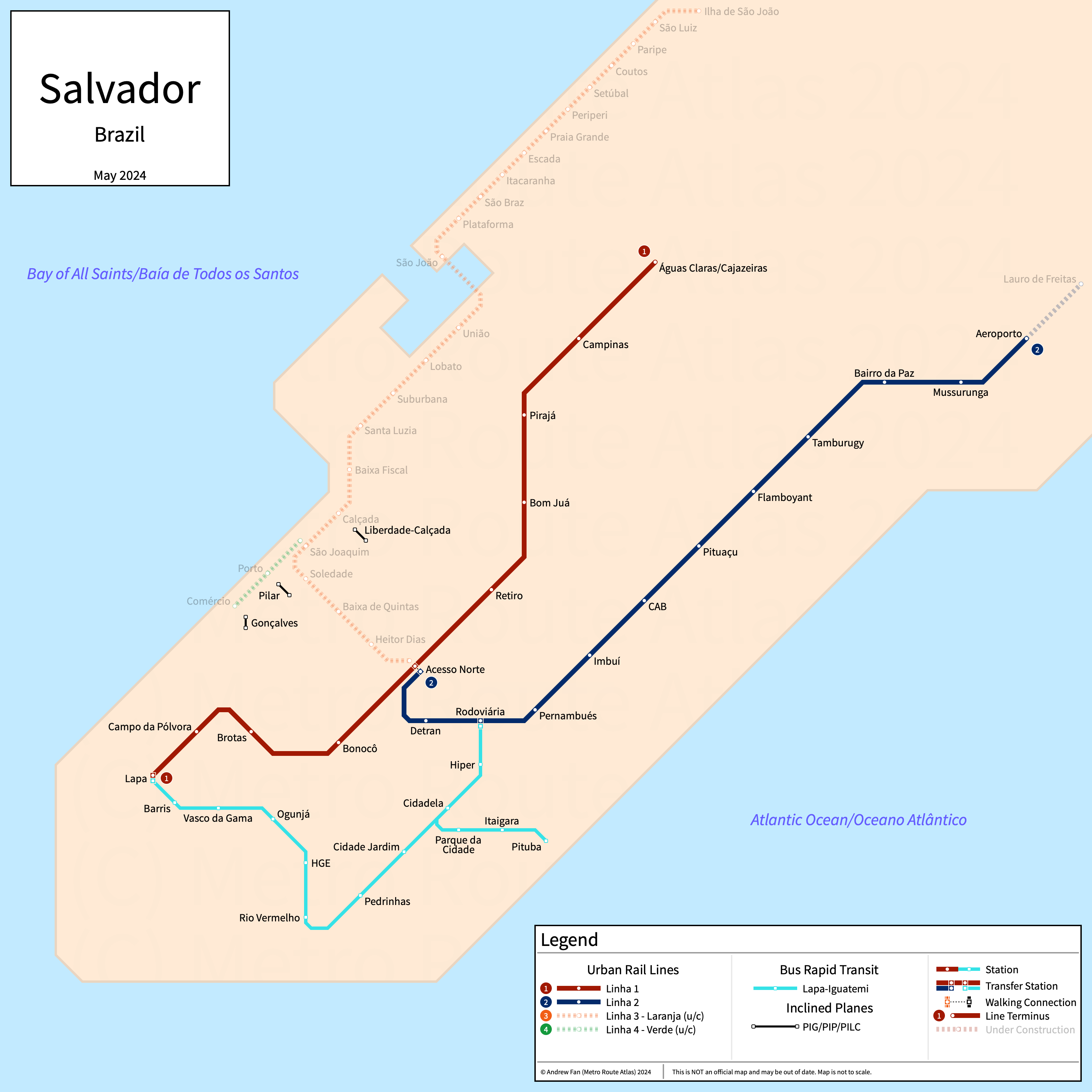Salvador, Bahia, Brazil
Table of Contents
Overview - Salvador
Located between the Bay of All Saints and the Atlantic Ocean, Salvador (São Salvador da Bahia de Todos os Santos) is the capital of and the largest city by population in Bahia. It has approximately 2,418,000 inhabitants in the city proper as of 2022. The Salvador metropolitan area comprised 3,320,568 residents as of the 2022 IBGE census estimate.
Salvador's rapid transit network consists of two metro services and a bus rapid transit line. It also has three funiculars.
Salvador Metro
Opened 2014, the Salvador Metro consists of two metro services that serve the city of Salvador, Bahia and the surrounding suburbs.
Line 1 (Linha 1)
Line 1 of the Salvador Metro is a metro service on a Northeast-Southwest alignment. It runs from Águas Claras in the northeast to Lapa in the southwest, serving 10 stations.
Line 1 was opened in June 2014 for trial service and September 2014 for revenue service, and the last extension to the line was to Águas Claras in December 2023. Line 1 is owned by the Government of the State of Bahia and operated by the Companhia do Metrô da Bahia (Metrô Bahia).
Line 2 (Linha 2)
Line 2 of the Salvador Metro is a metro service on a Northeast-Southwest alignment. It runs from Aeroporto in the northeast to Acesso Norte in the southwest, serving 12 stations.
Line 2 was opened in June 2016 and the last extension to the line was to Aeroporto in November 2017. Line 2 is owned by the Government of the State of Bahia and operated by the Companhia do Metrô da Bahia (Metrô Bahia).
Salvador BRT
Opened 2022, the Salvador BRT network consists of a bus rapid transit network that serves the city of Salvador, Bahia.
BRT Lapa-Iguatemi
The Lapa-Iguatemi corridor of the Salvador BRT is a bus rapid transit network on an east-west alignment. It runs from Rodoviária in the northeast to Pituba in the southeast and Lapa in the west, serving 14 stations. Service B1 serves Pituba-Rodoviária, B4 serves Lapa-Pituba, and B5 serves Lapa-Rodoviária - other services (B2, B3) go off-busway as pre-trunk lines making partial use of the BRT infrastructure.
Phases 1 and 3 of the Lapa-Iguatemi corridor were opened in October 2022 for trial service, excluding Pituba, which opened in March 2023 . Phase 2 opened in April 2024, though without most intermediate stations (opened with Cidade Jardim and Rio Vermelho) . Barris, HGE and Ogunjá, Pedrinhas, and Vasco da Gama opened later on. Direct service between Lapa and Rodoviária began in December 2024.
Salvador Funiculars
Opened in the late 19th century, the Salvador Funicular network consists of three funiculars that serve the city of Salvador, Bahia.
Plano Inclinado Gonçalves
The Plano Inclinado Gonçalves is a funicular. It connects the Cidade Alta and Cidade Baixa.
The Plano Inclinado Gonçalves was opened in 1889. The Plano Inclinado Gonçalves is owned by the Municipal City of Salvador and operated by Transalvador.
Plano Inclinado Pilar
The Plano Inclinado Pilar is a funicular. It connects the Cidade Alta and Cidade Baixa.
The Plano Inclinado Pilar was opened in 1889. The Plano Inclinado Pilar is owned by the Municipality of Salvador and operated by SEMOB.
Plano Inclinado Liberdade-Calçada
The Plano Inclinado Liberdade-Calçada is a funicular. It connects the Cidade Alta and Cidade Baixa.
The Plano Inclinado Liberdade-Calçada was opened in March 1981. The Plano Inclinado Liberdade-Calçada is owned by the Municipality of Salvador and operated by Transalvador.
References & Helpful Links
Salvador Metro at Wikipedia | Metrô de Salvador at Wikipedia.pt
Official Website for Salvador Metro: Metrô Bahia
Official Website for Salvador BRT: BRT Salvador
Maps
All Official Maps - Metrô Bahia [Last Accessed November 15, 2025]
Other Sources
Salvador, Brazil at Urbanrail.net
Salvador, Brazil at BRTDATA.org
Other Websites
External Citations
Asset Notes
Salvador Metro colors were taken from the official diagrammatic map as of August 2, 2022. VLT do Subúrbio colors taken from official map as of August 2, 2022. BRT Lapa-Iguatemi color taken from this website.
